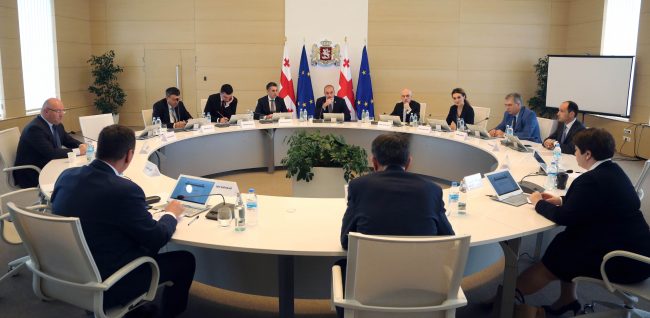


Georgia will cut the number of ministries from 14 to 11, disbanding the ministries of culture, IDPs, and corrections, according to plans laid out by Prime Minister Mamuka Bakhtadze following the first meeting of his cabinet on Tuesday. Bakhtadze said the process of selecting ministers was ‘almost over’ but declined to give names, as speculation in local media intensified over the future of embattled Justice Minister Tea Tsulukiani.
Prior to parliament’s approval of Bakhtadze and his cabinet on XX — which was almost entirely unchanged from his predecessor’s — he announced that this would be only a ‘temporary cabinet’ to be updated in the coming weeks along with changes to the government’s structure.
Speculation over whether Tsulukiani, who a number of prominent NGOs have demanded resign, will remain in government intensified after she did not attend the cabinet’s inaugural meeting. Minister of Corrections Kakha Kakhishvili, whose ministry is to be absorbed by the Justice Ministry, was also absent, leading to speculation that a decision to appoint one of the two to head the new expanded ministry had not been made.
Minister of Infrastructure Maia Tskitishvili responded to the speculation saying that both were on work trips and assured the press that their absence had nothing to do with ongoing changes in government.

Minister of IDPs, Accommodation, and Refugees Sozar Subari — who has served in government since Georgian Dream came to power in 2012 — confirmed on Tuesday that he would not be a part of the updated cabinet. The ministry will have its functions divided, with the Infrastructure Ministry taking over the settlement of the IDPs, the Interior Ministry migration issues, and Ministry of Health, Labour and Social Affairs take care of social policies.
The future of current Minister of Culture and Sport Mikheil Giorgadze is also uncertain, as his ministry will be absorbed by the Ministry of Education and Science.
The new prime minister said that ‘consultations about the new faces in the cabinet are almost over’, and promised to make the final list of members of the new cabinet public in the coming days. Bakhtadze expressed a hope that the changes would ‘lay the foundations for a small government’ and lead to ‘gradually lowering government expenditures to 3.9% of GDP’.
‘Too early to tell’
Sulkhan Saladze from local rights group the Georgian Young Lawyers’ Association told OC Media it was too early to evaluate the government changes as the country had seen ‘declarations and government programmes with detailed agendas on policy numerous times’, but that these were often not effectively implemented.
Suladze said the new government programme reflected demands for reform voiced by a number of NGOs, but that the identity of the future Justice Minister was also ‘relevant’ as ‘ the Justice Minister will have a leading role in the reforms’.
GYLA’s chair reiterated criticism of Tea Tsulukiani which have been shared by other leading groups working on justice and law enforcement reform. ‘Many important reforms under the present justice minister were not realised or were executed with significant flaws […] hence, we still think there is no place for the acting justice minister in the new cabinet’.
Before the cabinet’s approval, Tsulukiani called on ‘everybody’ to get involved in the selection process of a new Chief Prosecutor, but most advocacy groups rejected the invitation. Saladze said the government should not rush to appoint a new Chief Prosecutor, but amend the law instead so that a new Chief Prosecutor could be selected without the government’s involvement.
The opposition has been critical of the government changes. Roman Gotsiridze, an MP from the United National Movement (UNM) Party, said that ‘until obsolete bureaucratic budget expenditures are cut down, the result of structural changes will be zero’.
Georgian political scientist Vakhtang Dzabiradze told InterPressNews the country has already witnessed such ‘mechanical’ changes more than once, but they ‘never brought tangible results’. ‘As a rule, these kinds of changes also raise expenditures, not the other way around’, he added.









